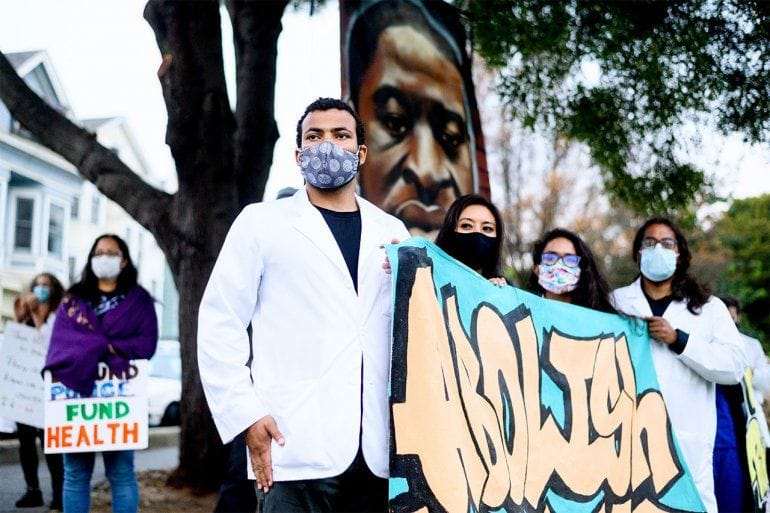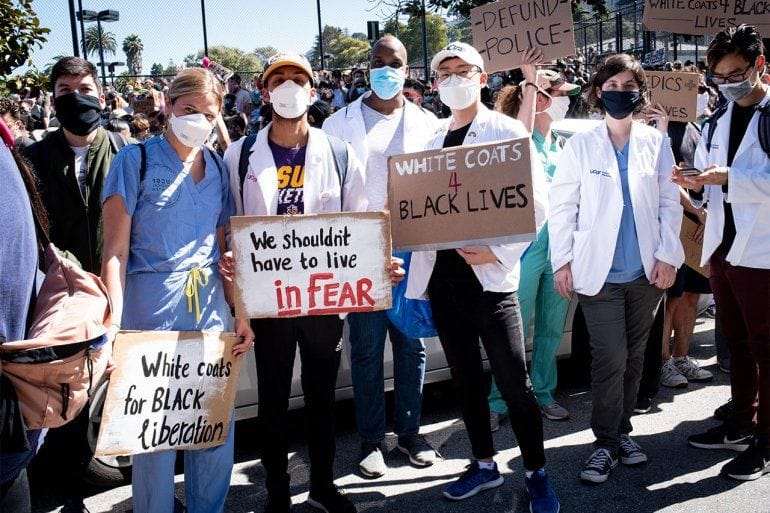
Open letter from healthcare workers including 100+ UCSF doctors calls for governor to act as state struggles with COVID-19
by White Coats for Black Lives
San Francisco – Healthcare workers sent an open letter with over 750 signatories to California Gov. Gavin Newsom on the morning of July 27 urging immediate action to reduce the state prison population to mitigate the spread of COVID-19. The signers, who include physicians, nurses, public health professionals, psychologists, community members and health professions students condemn the recent COVID-19 outbreak at San Quentin State Prison as a “public health crisis that impacts not only those Californians who are currently experiencing incarceration, but all of us.”
The current outbreak at San Quentin is the second largest in the nation, infecting over 2,401 people and resulting in at least 17 deaths. Public health experts and physicians who did an on-site evaluation in June have concluded that the only way to adequately stem the tide of infections at San Quentin is to reduce the incarcerated population to less than 50 percent capacity.
So far, Gov. Newsom has promised 8,000 releases, less than 7 percent of the 115,000 people in prisons state-wide. All of the top 10 largest COVID-19 outbreaks nationwide have been in prisons or jails and, of these, four have been in California.
In addition to calling for reductions in the statewide prison population, the letter’s authors call for the expansion of the definition of “medically vulnerable” in deciding who is eligible for release. The authors also call for prioritizing the release of incarcerated people over age 50, regardless of the crime of conviction, due to medical vulnerability.
UCSF infectious disease physician and Associate Dean Peter Chin Hong stressed the importance of decreasing the prison population: “Prisons are a petri dish for COVID-19, and it affects all of us. It affects health care workers and surrounding hospitals when we’re already struggling to fight this pandemic; it affects our community as prison staff live in our neighborhoods, and it affects those incarcerated who are powerless to prevent its spread.
“To me it’s a no-brainer: We need to reduce the numbers inside our prisons. When restaurants eventually reopen, we won’t allow one to be 120 percent full. The way we’ve emptied out stadiums, schools and houses of worship, that’s what we need to do for prisons to reduce circulating the virus in our community.”
Incarcerated individuals should not be consigned to death because of Newsom’s refusal to act.
Neeta Thakur, UCSF critical care physician and pulmonologist who serves as medical director of the Chest Clinic and co-founder of the Post Critical Illness Recovery Clinic at Zuckerberg San Francisco General, agrees: “We are at the nascent stages of understanding the long term effects of this virus. But we are already seeing many people with ongoing respiratory damage and cognitive impairment, both of which are concerning and have long-term implications if they persist.
“Forced exposure of incarcerated Californians to COVID-19 is unethical, it’s inhumane, it’s cruel. When we take into account the clear data that Black Americans are disproportionately harmed by mass incarceration, policing and racially-biased jurisprudence, our failure to take action becomes an act of racial violence. We need to reduce the prison population now.”
In demanding decarceration, the authors emphasized that “the majority of the current measures to contain the spread inside prisons are not sustainable in the long term. Additionally, many of these measures are punitive and will significantly negatively impact the physical and mental health of those inside. Current practices include indefinitely confining people to cells or units, barring visitors and limiting phone calls, eliminating classes and programming, and reducing access to medical visits. Notably, many of those incarcerated have had onsite and offsite specialty visits, procedures and surgeries postponed.”

Member of White Coats for Black Lives, co-author of the statement, and UCSF Medical Student Erika Stephens highlighted additional problems generated by confinement to close quarters: “With prison cells the size of a parking spot, overcrowding and inadequate access to necessary sanitation supplies, it is virtually impossible to prevent the spread of the virus within the prison. Incarcerated individuals should not be consigned to death because of Newsom’s refusal to act. It is an act of gross medical negligence.”
In agreement with Erika, Dr. Juliana E. Morris, a family physician who has worked with people experiencing homelessness during the COVID-19 pandemic, sought to allay concerns about the release: “Although Gov. Newsom has expressed concern that people might be homeless when released, leaving people locked up in cages is not a humane alternative. We must invest in housing for all, including temporary housing in hotels, rather than continued incarceration.”
The letter’s authors leave Gov. Newsom with a list of desired direct actions, beginning with decreasing the number of people within prisons.
The authors close with an appeal to the governor: “We realize that you may face political pushback but we urge you to listen to public health experts, look at the data and act with courage to do what is right.”
The statement was authored by a group of health professionals and health professional students convened by White Coats for Black Lives, a medical student-led organization that has gained national recognition for racial justice advocacy.
The open letter to Gov. Newsom can be accessed here: https://link.medium.com/bTJ43gCas8.
White Coats for Black Lives can be reached at whitecoats4blacklivesatUCSF@gmail.com.





